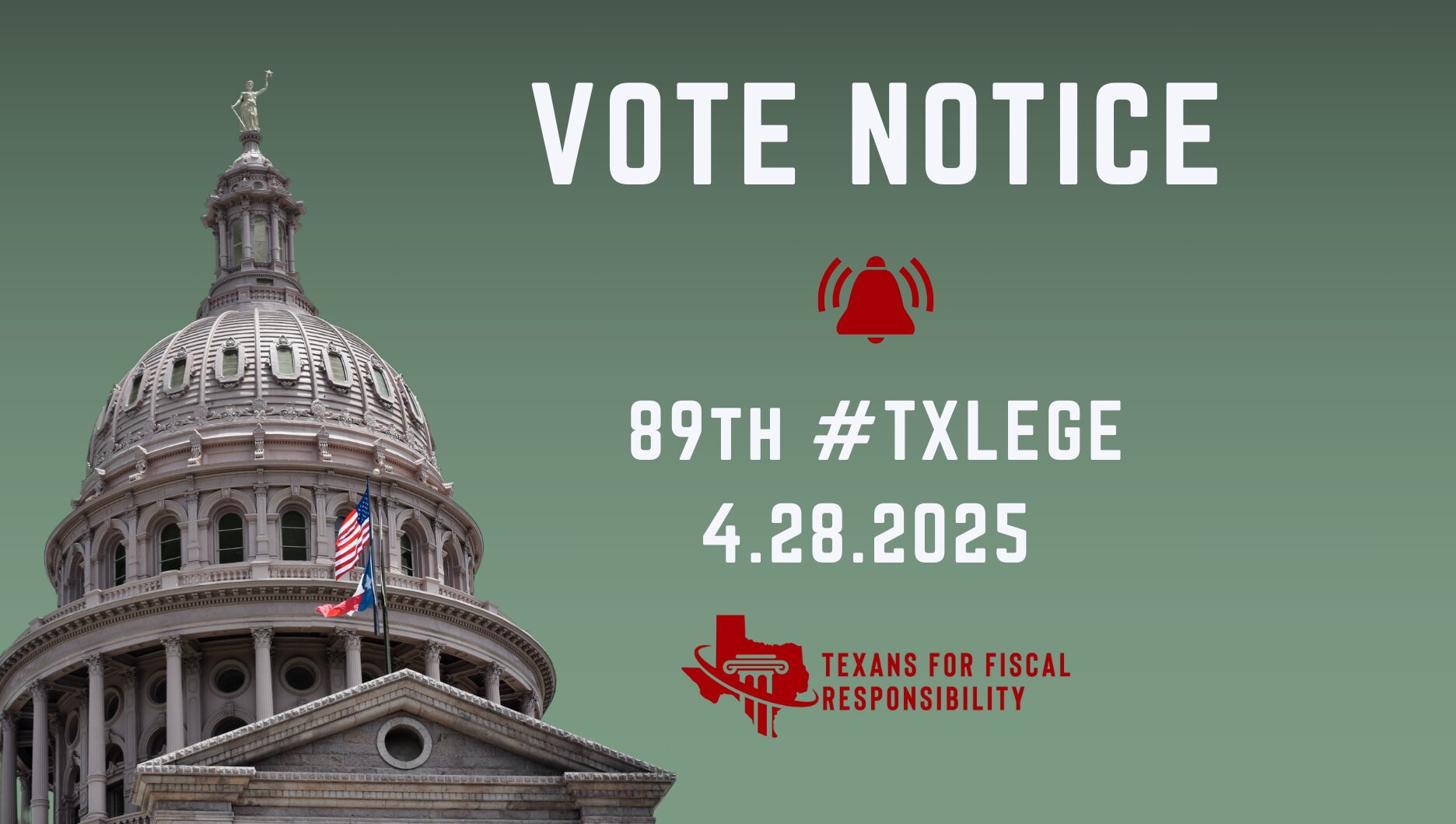
Texans for Fiscal Responsibility has issued the following vote notice for April 28th, 2025
Texas House of Representatives
Subject: House Bill 23 (HB 23) – Third-party development reviews
- Author: State Rep. Cody Harris (R-Palestine)
- Caption: Relating to the authority of certain persons to obtain third-party review of plats and property development plans, permits, and similar documents, and the inspection of an improvement related to such a document.
- TFR Position: SUPPORT / AMEND
- Background:
- HB 23 allows property developers and homeowners to bypass local government bottlenecks by hiring qualified third parties to review their development plans and conduct inspections. This empowers applicants to avoid costly delays that drive up housing costs and hurt affordability. Under the bill, licensed engineers and certified inspectors can perform these tasks, with their approvals legally binding on the local authority. To protect taxpayers and governments, third parties must carry insurance. Cities and counties cannot impose additional approvals or deny third-party results. This reform enhances transparency, reduces regulatory delays, and supports faster homebuilding, which helps address Texas’s housing affordability challenges. Overall the bill helps protect property rights and affordability. However, the bill should be amended by exempting small, rural cities and counties with limited development activity, ensuring they aren’t burdened with administrative requirements better suited for larger jurisdictions. Providing a population or permit volume threshold for exemption would focus the reform where it’s actually needed — in larger, faster-growing areas of the state.
Subject: House Bill 103 (HB 103) – Taxpayer transparency for local debt
- Author: State Rep. Ellen Troxclair (R-Spicewood)
- Caption: Relating to the creation and maintenance of a database of taxing unit bond, tax, and bond-related project information; providing a civil penalty.
- TFR Position: SUPPORT
- Background:
- HB 103 would require the Texas Comptroller to create a statewide online database showing detailed information about local governments’ bond debt, tax rates, and bond-funded projects. Taxpayers would be able to easily access data about how much debt their local governments have taken on, how bond money is being used, and how property tax elections have impacted their bills. This improves transparency and makes it easier for citizens to track public debt and tax increases. The bill is a win because it equips voters with facts to hold local governments accountable and discourages reckless borrowing and tax hikes.
Subject: House Bill 148 (HB 148) – Erodes local voter sovereignty
- Author: State Rep. Chris Turner (D-Grand Prairie)
- Caption: Relating to the qualification of candidates for, and the training and education of members of, the board of directors of an appraisal district.
- TFR Position: OPPOSE
- Background:
- HB 148 mandates ongoing, government-prescribed training for appraisal district board members, creating new regulatory hurdles and compliance costs and adds layers of bureaucracy and potential liabilities for board members. It imposes new eligibility requirements on candidates seeking a position on an appraisal district board of directors. Before even appearing on the ballot or being appointed, individuals must sign a detailed acknowledgment outlining a wide range of statutory duties. This additional step could deter some potential candidates, particularly those unfamiliar with legal or bureaucratic processes, narrowing the field of individuals eligible to serve. By requiring annual training and tying compliance to a risk of removal, the bill introduces new administrative barriers that could interfere with voters’ ability to freely select and retain their representatives. These measures shift more control over who may serve from local communities to procedural rules administered by institutions. While intended to promote informed leadership, the requirements may unintentionally restrict grassroots participation and limit the diversity of perspectives on appraisal district boards. In this way, the bill could serve as an obstacle to full local voter sovereignty over their own appraisal oversight bodies.
Subject: House Bill 2156 (HB 2156) – Streamlines restaurant regulation
- Author: State Rep. Cody Harris (R-Palestine)
- Caption: Relating to state and local authority to regulate the food service industry.
- TFR Position: SUPPORT
- Background:
- HB 2156 curbs the ability of local governments to burden food businesses with unnecessary and duplicative permits, licenses, and fees. It standardizes regulations statewide by tying local rules and fees to the same standards used by the Texas Department of State Health Services (DSHS), helping small businesses avoid costly confusion. Local governments will no longer be able to charge higher fees unless specific population thresholds are met and public hearings are held, ensuring greater accountability. The bill also shields restaurants from being hit with extra sound regulations that stifle reasonable business operations. By making it easier for mobile food units and caterers to serve workplace events without facing new local permits, the bill reduces regulatory barriers for small operators. Additionally, it blocks cities from double-charging businesses that already pay for food service permits. Importantly, HB 2156 empowers businesses to take legal action if local governments overstep these limits. This reform strengthens property rights, promotes business growth, and protects taxpayers from inflated local government bureaucracy.
Subject: House Bill 3260 (HB 3260) – Expanded apprenticeship subsidies
- Author: State Rep. Keith Bell (R-Forney)
- Caption: Relating to the Texas Industry-Recognized Apprenticeship Programs Grant Program.
- TFR Position: OPPOSE
- Background:
- HB 3260 allows the Texas Workforce Commission to issue partial, milestone-based reimbursements to employers participating in the Industry-Recognized Apprenticeship Grant Program. Rather than waiting until a full apprenticeship and a year of post-employment are completed, businesses would get funding earlier as certain steps are completed. The bill also gives TWC new authority to set standards for which jobs and programs qualify. While the goal is to encourage more employers to offer apprenticeships, the bill risks expanding government subsidy programs without strong oversight or fiscal safeguards. Faster and more frequent reimbursements could increase program costs and reduce accountability for whether training results in lasting employment. Shifting certification power to a state agency could also politicize which industries and programs receive taxpayer-funded benefits. From a limited government perspective, the program represents another layer of workforce intervention and spending. Instead, Texas should prioritize private-sector driven training without long-term taxpayer liability.
Subject: House Bill 3770 (HB 3770) – Mandatory state agency efficiency audits
- Author: State Rep. Giovanni Capriglione (R-Southlake)
- Caption: Relating to efficiency and strategic fiscal reviews of state agencies conducted by the Legislative Budget Board.
- TFR Position: SUPPORT
- Background:
- HB 3770 improves government oversight by making it mandatory for the Legislative Budget Board to conduct in-depth efficiency reviews of state agencies and programs. Rather than waiting for Sunset reviews, the LBB will proactively evaluate at least 25 agencies and 40 programs every two years. This bill strengthens taxpayer protections by requiring cost-savings strategies and detailed reporting on potential fiscal benefits over a five-year period. Including public universities in the review process ensures that higher education spending is also scrutinized for waste and inefficiency. By repealing duplicative and outdated audit requirements, HB 3770 streamlines government operations. Allowing the LBB to independently initiate strategic fiscal reviews provides flexibility to respond quickly to inefficiencies. Ultimately, the bill prioritizes responsible use of taxpayer dollars and promotes smaller, more accountable government.
Subject: House Bill 322 (HB 322) – Expands JET grants
- Author: State Rep. Ryan Guillen (R-Rio Grande City)
- Caption: Relating to the use of funds awarded under the Jobs and Education for Texans (JET) Grant Program.
- TFR Position: OPPOSE
- Background:
- HB 322 would allow JET grant funds to be used not just for tangible classroom equipment, but also for technology systems and their ongoing upkeep. While intended to modernize career training programs, the bill opens the door to spending taxpayer dollars on vague “technology solutions” without clear limits. This risks shifting resources away from direct student tools toward bloated administrative or tech consulting expenses. Expanding the scope of the grants dilutes their original purpose of directly equipping students for high-demand jobs. It could also create a recurring taxpayer obligation for maintenance costs, straying from the one-time investment model of JET. This bill weakens accountability and invites mission creep within a program originally designed for targeted benefits.
Subject: House Bill 431 (HB 431) – Defends private property energy choice
- Author: State Rep. Philip Cortez (D-San Antonio)
- Caption: Relating to the regulation by a property owners’ association of the installation of solar roof tiles.
- TFR Position: SUPPORT
- Background:
- HB 431 strengthens property owners’ rights by ensuring that modern solar roof tiles are protected from unreasonable restrictions by homeowners’ associations. It clarifies that solar roof tiles qualify as “solar energy devices,” guaranteeing homeowners the freedom to invest in cost-saving, energy-efficient technology without bureaucratic interference. By closing a loophole left open when previous laws were written, this bill prevents overreaching property associations from blocking innovation. Supporting this bill promotes private property rights, energy independence, and consumer choice. It limits unnecessary control by quasi-governmental associations that often act without taxpayer accountability. Encouraging solar technology through private initiative—without subsidies or mandates—respects free-market principles. HB 431 is a small but important step to reduce regulatory barriers that stifle homeowner investments and property rights.
Subject: House Bill 1203 (HB 1203) – Creates new government food office
- Author: State Rep. Jessica González (D-Dallas)
- Caption: Relating to the establishment of the office of food system security and resiliency in the Department of Agriculture and the management of the Texas food system security and resiliency planning council.
- TFR Position: OPPOSE
- Background:
- HB 1203 would create a brand-new division within the Texas Department of Agriculture focused on food system security and resiliency. While addressing food insecurity is important, establishing a permanent new government office grows bureaucracy and increases long-term costs to taxpayers. Instead of empowering private and local initiatives, this bill layers another government-managed program onto existing frameworks, at taxpayer expense. It risks duplicating the work already being done by nonprofits, private food producers, and local governments without proven need for a statewide agency. The bill mandates continuous reporting and legislative recommendations, ensuring the office’s expansion and mission creep over time. A better approach would encourage private sector solutions without expanding state government.
Subject: House Bill 1201 (HB 1201) – Medicaid expansion
- Author: State Rep. Christian Manuel (D-Port Arthur)
- Caption: Relating to a pilot program to provide Medicaid coverage of doula services.
- TFR Position: OPPOSE
- Background:
- HB 1201 would set up a taxpayer-funded Medicaid pilot program to pay for doula services in select Texas counties. While it aims to improve maternal health outcomes, it does so by expanding the role of Medicaid and increasing ongoing costs to taxpayers without clear cost containment. The pilot would require new government spending estimated at over $1.35 million in just the first two years, plus annual costs afterward. It also authorizes HHSC to define who qualifies as a doula and what services are covered, inviting future rule changes that could broaden the program beyond its original scope. Although improving maternal health is important, this bill expands Medicaid services and creates a new layer of bureaucracy. The bill represents unnecessary government expansion at taxpayer expense. Solutions that encourage private-sector or charity-driven support models would better serve Texas families without burdening taxpayers.
Subject: House Bill 1244 (HB 1244) – Protects landowners from tax penalties
- Author: State Rep. Ryan Guillen (R-Rio Grande City)
- Caption: Relating to the eligibility of land to continue to be appraised for ad valorem tax purposes as qualified open-space land following a transfer to a person who uses the land in materially the same way as the former owner and to late applications for such appraisal filed by the new owner of the land.
- TFR Position: SUPPORT
- Background:
- HB 1244 protects landowners from unnecessary tax penalties when they restructure ownership of agricultural or open-space land without changing how the land is used. Instead of penalizing families and small landowners for administrative paperwork, the bill rightly recognizes substance over form. If the same people continue to manage the land in the same way, taxpayers should not be forced to reapply or risk losing valuable tax treatment. HB 1244 eliminates an unnecessary bureaucratic burden, promotes stability in land use, and prevents government overreach into private property matters. It also provides flexibility by allowing a one-year grace period for late applications without penalty. By cutting red tape and shielding landowners from avoidable costs, the bill upholds principles of limited government and taxpayer protection.
Texas Senate
Subject: Senate Bill 500 (SB 500) – Streamlines foster care process
- Author: State Sen. Kevin Sparks (R-Midland)
- Caption: Relating to access to certain information in the adoption process.
- TFR Position: SUPPORT
- Background:
- SB 500 makes important improvements to Texas’ adoption process by requiring quicker turnaround times for critical background information about foster children. By enforcing a 45-day deadline to provide health and history reports and a 90-day deadline to deliver full case records after request, it ensures fewer bureaucratic delays. The bill also reduces unnecessary redactions, preserving only truly confidential information. Th bill helps children find permanent homes faster, meaning the state spends less on long-term foster care. It promotes efficiency, limits government waste, and helps families without growing bureaucracy. Prospective parents also face clear requirements like nondisclosure agreements to protect sensitive information, balancing privacy with timely access. Overall, this bill is a smart reform that protects children, helps taxpayers, and makes the adoption system work more effectively.
Subject: Senate Bill 646 (SB 646) – Expands mental health loan subsidies
- Author: State Sen. Royce West (D-Dallas)
- Caption: Relating to repayment of certain mental health professional education loans.
- TFR Position: OPPOSE
- Background:
- SB 646 substantially expands Texas’ Mental Health Professionals Loan Repayment Program, adding new categories of workers and sharply increasing the maximum repayment amounts. By enlarging the pool of eligible recipients and offering new financial bonuses, the bill guarantees that program costs will balloon far beyond their original scope. It also allows up to $1 million in taxpayer funds to be spent on marketing the program, further compounding government expenses. Expanding eligibility to school counselors and lower-level associates, rather than narrowly targeting severe shortages, dilutes the program’s focus and invites waste. While mental health access is important, this bill moves Texas further away from fiscal restraint, and should be opposed.
Subject: Senate Bill 1169 (SB 1169) – Expands PUA debt authority
- Author: State Sen. Adam Hinojosa (R-Corpus Christi)
- Caption: Relating to the provision of water or sewer service by public entities operating jointly or concurrently.
- TFR Position: OPPOSE / AMEND
- Background:
- SB 1169 expands the authority of public utility agencies (PUAs) by allowing them to issue new forms of debt, impose special assessments on ratepayers, and tap international financing sources like the North American Development Bank. While the bill rightly adds a pathway for ratepayers to appeal utility rate hikes to the Public Utility Commission, it simultaneously creates serious fiscal risks by letting PUAs leverage future revenues without strong taxpayer protections or direct local oversight. Granting broad bonding and assessment powers without requiring voter approval invites hidden debt accumulation, shifting future costs onto taxpayers without meaningful accountability. Although the prohibition on eminent domain limits some government overreach, the bill would be significantly improved by requiring PUAs to seek local voter approval before issuing new debt or imposing special assessments. Additionally, stronger transparency requirements—such as mandatory public disclosures of all debt obligations and project costs—would help guard against fiscal mismanagement.
Subject: Senate Bill 1972 (SB 1972) – Protects trustee speech rights
- Author: State Sen. Mayes Middleton (R-Galveston)
- Caption: Relating to a limitation on rules, bylaws, and policies adopted by a school district’s board of trustees.
- TFR Position: SUPPORT
- Background:
- SB 1972 strengthens transparency and accountability in local school governance by protecting the right of elected trustees to voice their opinions publicly. Instead of allowing boards to silence dissenting viewpoints, this bill ensures that individual trustees can keep their communities informed about important decisions or topics. It reinforces that trustees serve the people, not the institution. It helps prevent groupthink and insider control, which often lead to wasteful spending and bad policies. Protecting trustees’ free speech encourages diverse perspectives, leading to more fiscally responsible and locally accountable governance. Limiting government-imposed speech restrictions aligns with a core principle of safeguarding individual liberty and promotes a more open, taxpayer-centered education system.
Subject: Senate Bill 2173 (SB 2173) – Protects homebuyers from past taxes
- Author: State Sen. Tan Parker (R-Flower Mound)
- Caption: Relating to the effect of a tax certificate accompanying a transfer of certain property.
- TFR Position: SUPPORT
- Background:
- SB 2173 protects homebuyers from being stuck with unexpected tax debts tied to mistakes made by previous property owners. It ensures that if a buyer relies on an official tax certificate showing no taxes are owed, they will not be financially penalized later if an error is discovered. This increases certainty for buyers and helps promote property transactions by reducing legal and financial risks. It also limits government overreach by making local taxing authorities honor their official records. At the same time, it preserves personal accountability by holding the prior owner, not the innocent buyer, responsible for any unpaid taxes. SB 2173 is a straightforward, pro-taxpayer reform that upholds property rights, encourages responsible government recordkeeping, and protects taxpayers from being blindsided by mistakes out of their control.
Subject: Senate Bill 2225 (SB 2225) – Consumer choice in alcohol sales
- Author: State Sen. Kelly Hancock (R-North Richland Hills)
- Caption: Relating to the creation of a spirit cooler certificate; authorizing a fee.
- TFR Position: SUPPORT
- Background:
- SB 2225 removes outdated barriers in Texas law by allowing convenience and grocery stores to sell spirit-based ready-to-drink cocktails, just as they already sell beer and wine. This promotes free-market competition, giving consumers more choices. It treats similar low-alcohol beverages consistently, eliminating unnecessary government favoritism between products. By establishing clear guidelines and minimal new regulation, the bill prevents monopolistic practices while ensuring fair competition among wholesalers. Importantly, SB 2225 avoids expanding government control, instead modernizing the Alcoholic Beverage Code to match today’s marketplace.
Subject: Senate Bill 2779 (SB 2779) – Prevents misuse of HOT taxes
- Author: State Sen. Brian Birdwell (R-Granbury)
- Caption: Relating to the allocation and use of certain hotel occupancy tax revenues.
- TFR Position: SUPPORT
- Background:
- SB 2779 strengthens taxpayer protections by ensuring that hotel occupancy tax revenues are used as originally intended—to clean and maintain public beaches—without political favoritism. The bill requires coastal cities to pass hotel tax dollars directly to park boards responsible for beach upkeep as intended, removing unnecessary bureaucratic layers that can delay or misuse funds. It prevents local governments from tying tax dollars to discriminatory or politically motivated conditions, promoting fairness and neutrality. By requiring clear reporting and proof of compliance, the bill increases transparency and discourages wasteful or misdirected spending. The bill helps to uphold limited government principles by focusing municipal spending on core services rather than social engineering programs.
Subject: Senate Bill 2880 (SB 2880) – Citizen enforcement against abortion trafficking
- Author: State Sen. Bryan Hughes (R-Mineola)
- Caption: Relating to abortion, including civil liability for distribution of abortion-inducing drugs; making conforming changes and harmonizing conforming provisions; authorizing a private civil right of action.
- TFR Position: SUPPORT
- Background:
- SB 2880 strengthens enforcement against the distribution of illegal abortion-inducing drugs in Texas by empowering private citizens to bring civil lawsuits against those who traffic these substances. The bill enables a decentralized, citizen-driven mechanism to uphold existing abortion laws. By holding manufacturers and distributors financially accountable — including through market-share liability — it ensures those responsible for harm bear the cost rather than taxpayers. The bill discourages companies from profiting off illegal drug sales and blocks online platforms and payment processors from facilitating these transactions. The extended six-year statute of limitations ensures that injuries to women and families can be redressed over time without constant state oversight. Overall, this approach is a pro-family reform that respects Texas values of limited government, personal responsibility, and fiscal prudence.
Subject: House Joint Resolution 4 (HJR 4) – Ban on financial transaction taxes
- Author: State Rep. Morgan Meyer (R-Dallas)
- Caption: Proposing a constitutional amendment prohibiting the enactment of a law imposing an occupation tax on certain entities that enter into transactions conveying securities or imposing a tax on certain securities transactions.
- TFR Position: SUPPORT
- Background:
- HJR 4 protects investors and financial markets by amending the Texas Constitution to prohibit new taxes on securities transactions or on the institutions that process them. By doing so, it safeguards retirement accounts and public pensions from decreased returns caused by higher transaction costs. The measure ensures Texas remains an attractive state for financial operations by rejecting burdensome taxation that could drive business away. For these reasons, TFR supports HJR 4.
Reminder: Vote Notices are provided to both Texas state lawmakers and the general public, sharing Texans for Fiscal Responsibility’s position on issues to be rated as a part of the Fiscal Responsibility Index. Notices are provided prior to votes being taken in each legislative chamber.
Disclaimer: We reserve the right to consider amendments to legislation that may be introduced without notice as a part of issues to be rated on the Fiscal Responsibility Index. We will make every effort to provide notice on amendments that are pre-filed.




